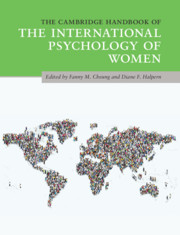Book contents
- The Cambridge Handbook of the International Psychology of Women
- The Cambridge Handbook of the International Psychology of Women
- Copyright page
- Dedication
- Contents
- Figures
- Tables
- Contributors
- Acknowledgments
- Section 1 The Underpinnings of Sex and Gender and How to Study Them
- Section 2 Developmental Perspectives of the International Psychology of Women
- Section 3 Cognitive and Social Factors
- Section 4 Work and Family Issues
- Section 5 Inequality and Social Justice
- Section 6 Health and Well-Being
- 31 Happiness across Cultures and Genders
- 32 Women under Pressure
- 33 Gender and Women’s Sexual and Reproductive Health
- 34 Physical Health
- 35 Women and Suicidal Behavior
- 36 Sex and Gender in Psychopathology
- 37 Women and Psychotherapy
- Epilogue Some Final Thoughts and Take-Home Messages
- Index
- References
34 - Physical Health
Women’s Sexual Embodiment after Cancer
from Section 6 - Health and Well-Being
Published online by Cambridge University Press: 20 July 2020
- The Cambridge Handbook of the International Psychology of Women
- The Cambridge Handbook of the International Psychology of Women
- Copyright page
- Dedication
- Contents
- Figures
- Tables
- Contributors
- Acknowledgments
- Section 1 The Underpinnings of Sex and Gender and How to Study Them
- Section 2 Developmental Perspectives of the International Psychology of Women
- Section 3 Cognitive and Social Factors
- Section 4 Work and Family Issues
- Section 5 Inequality and Social Justice
- Section 6 Health and Well-Being
- 31 Happiness across Cultures and Genders
- 32 Women under Pressure
- 33 Gender and Women’s Sexual and Reproductive Health
- 34 Physical Health
- 35 Women and Suicidal Behavior
- 36 Sex and Gender in Psychopathology
- 37 Women and Psychotherapy
- Epilogue Some Final Thoughts and Take-Home Messages
- Index
- References
Summary
This chapter will examine physical health through the example of women’s sexual embodiment after cancer. Women’s sexual embodiment can become disrupted after cancer due to a range of physical changes, body dissatisfaction, and psychological distress, leading to diminished sexual well-being. Life stage, couple relationship status and quality, cultural background, and sexual identity can shape women’s experience of sexual change. Existing studies have predominantly reflected Western cultural discourses that privilege a biomedical model of sexual dysfunction, heterosexual relationship dynamics, and the value placed on body appearance for feminine identity. Such discourses inform "abnormal," "unfeminine," and "unsexual" meanings that women ascribe to their bodies after cancer. However, women also report discursive and practical strategies they use to positively renegotiate embodied change. Health professionals can support women with cancer by giving permission for the discussion of sexual matters, providing information, and acknowledging and normalizing sexual change.
Keywords
- Type
- Chapter
- Information
- The Cambridge Handbook of the International Psychology of Women , pp. 483 - 496Publisher: Cambridge University PressPrint publication year: 2020
References
Suggested Readings

Chloe Parton is an Adjunct Fellow at the Translational Health Research Institute and School of Medicine at Western Sydney University. Her research interests are focused on women’s sexual and reproductive health, as well as gendered experiences of chronic illness, with a focus on cancer. Her doctoral research explored women’s negotiation and experience of sexual change after cancer. She is currently researching women’s experiences of motherhood while living with a chronic physical health condition. Parton was born and raised in Aotearoa New Zealand. She has spent a significant amount of her adult life as a migrant, having worked in Australia, Ireland, and the UK.

Jane Ussher is Professor of Women’s Health Psychology, Western Sydney University. She has published widely on the construction and lived experience of health, in particular women’s mental health, the reproductive body, and sexuality. She is editor of the Routledge “Women and Psychology” book series, and author of a number of books, including: The psychology of the female body (1989), Women’s madness: Misogyny or mental illness? (1991), Fantasies of femininity: Reframing the boundaries of sex (1997), Managing the monstrous feminine: Regulating the reproductive body (2006), and The madness of women: Myth and experience (2011). Ussher was born in the UK where she attended college and graduate school and now works in Australia. She identifies as lesbian.

Janette Perz is Professor of Health Psychology and Director of the Translational Health Research Institute at Western Sydney University. She researches in the field of reproductive and sexual health with a particular focus on gendered experiences, subjectivity, and identity. Perz has undertaken a significant research program in sexual and reproductive health, including the experience of premenstrual syndrome (PMS) in heterosexual and lesbian relationships; the development of and evaluation of a couple-based psychological intervention for PMS; sexual well-being and reproductive needs in CALD populations; and sexual and psychological well-being during menopause and midlife. Perz identifies as lesbian.

Lisa R. Rubin is an Associate Professor of Psychology and co-director of the Gender and Sexuality Studies Certificate program at the New School for Social Research in New York. She received her doctorate in Clinical Psychology from Arizona State University and was a postdoctoral fellow at Memorial Sloan Kettering Cancer Center before joining the New School faculty. Her scholarship is situated at the nexus of health psychology and psychology of gender and draws on interdisciplinary perspectives to examine processes of objectification and medicalization, and their influence on well-being. Her research spans and integrates work on body image, psycho-oncology, and assisted reproductive technologies. Rubin was born in northeast United States, where she grew up in an ethnically Jewish family and household. Attending graduate school in Arizona felt like going abroad to another country. She has traveled and experienced language immersion programs in Spain (Salamanca) and Guatemala.

